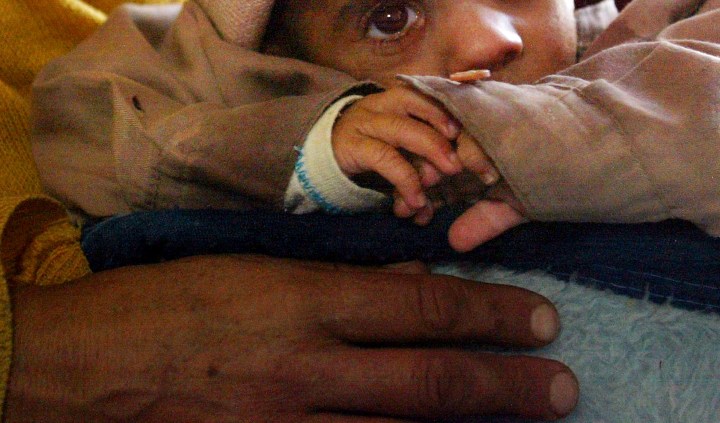MAVERICK CITIZEN
Practical solutions needed to overcome South Africa’s child malnutrition crisis

South Africa constantly teeters on the edge of food insecurity, and the Covid-19 lockdown has just pushed us over the edge. Inevitably, access to food will be a major social and political issue for the next two years, leading into the local government elections. For that reason, it is in everybody’s interest that we address malnutrition and find urgent and practicable ways to ensure greater food security.
Before the Covid-19 epidemic, 20% of households already had insufficient food. Now, loss of employment, disruption of the informal economy, disruption of programmes provided by civil society, and rising food prices, have tipped the balance for many more families, raising levels of hunger and threatening to cause a spike in acute malnutrition.
We have been having a crisis of malnutrition for decades. More than a quarter of our children under five years are stunted. Countries use stunting as a measure of a population’s nutritional status. It signifies undernutrition over a period of time which prevents children from reaching the height expected for their age.
Research published in the Lancet shows South Africa is one of only 20 countries accounting for 80% of the world’s stunted children. Our stunting rate of 27% has persisted for decades. It does not compare well to other upper-middle-income countries such as Brazil (7%), China (8.1%) and Mexico (10%). Indeed, some lower-income countries fare better than South Africa (Bolivia 16.1%; Sri Lanka 17.3%; Senegal 16.5%).
So, what does it matter if our children are shorter than expected?
Inadequate nutrition in pregnancy and early childhood has severe short- and long-term impacts. An audit of mortality data showed that in 2018, 31% of children who died in South Africa were severely malnourished, and a further 27% were underweight. This means that undernutrition is associated with 58% of child deaths. Undernutrition weakens the immune system, making children more susceptible to infections, especially pneumonia and diarrhoea, which are major causes of childhood mortality. Infections decrease appetite and increase the need for nutrients, fuelling a vicious cycle with undernutrition.
Undernutrition not only affects the physical growth of children, but also the development of the brain.
The first thousand days (from conception to two years of age) is a time of rapid growth and neurodevelopment, and a lack of sufficient nutrients has devastating effects. Research proves beyond doubt that undernutrition is associated with achieving lower educational levels, being less economically productive, and having a lower socio-economic status as an adult. It is the main reason South Africa fares so badly in the World Bank’s Human Capital Index, which predicts the likelihood of a child achieving his or her full economic potential. On a scale of 0-1, with 1 being 100% probability, South Africa is 0.41.
As Covid-19 puts a spotlight on hunger, we should allow the light to illuminate the full extent of the problem of undernutrition. We need to identify children who are not growing well and implement timely interventions. We need to redouble our efforts to ensure that all children have access to enough nutritious foods, to adequate health care, and to nurturing homes.
During the first thousand days, other organs and hormonal systems are also developing, and disruptions change the body’s metabolic capacity resulting in a higher risk of hypertension, diabetes and obesity in later life. Some of these metabolic effects are caused by epigenetic changes, and thus the effects of undernutrition are intergenerational.
Addressing malnutrition is complex, and the multiple factors at individual, household and societal levels that drive malnutrition ultimately need to be tackled. However, there are models that are effective, that need to be rolled out more widely.
One such example is the Mentor Mother Programme developed by Philani Maternal, Child Health and Nutrition Trust. Philani has been providing a comprehensive home-based programme to pregnant women and children for 40 years in the Western Cape and 10 years in the Eastern Cape.
Community health workers, called ‘mentor mothers’ are trained in maternal and child health, early childhood development, and alcohol harms reduction intervention. Mentor mothers visit families at home, support mothers and care-givers, and empower them to improve the health and well-being of their children. They weigh children at home, identify underweight or growth-faltering children, and implement an intervention to get them back on track. Mothers are supported to breastfeed their babies, make nutritious meals, and provide a stimulating environment for their children.
Philani’s programme has been rigorously evaluated, and results show that children on the programme grow better, are less likely to be stunted, have better vocabularies, and have fewer hospital admissions. Mothers are less likely to have low birth weight babies, adhere better to chronic medications, achieve better breastfeeding rates, and have reduced rates of problematic drinking.
As Covid-19 puts a spotlight on hunger, we should allow the light to illuminate the full extent of the problem of undernutrition. We need to identify children who are not growing well and implement timely interventions. We need to redouble our efforts to ensure that all children have access to enough nutritious foods, to adequate health care, and to nurturing homes.
The World Bank argues that investing in childhood nutrition is one of the most cost-effective actions for global development, with every $1 invested in averting stunting achieving an $11 economic return. While some of the interventions, such as pregnancy and child care grants, must be implemented nationally, others require sustained effort in local communities across South Africa.
In this regard, programmes like Philani point the way forward. DM/MC
Claudine Bill is a medical doctor at Philani Maternal, Child Health and Nutrition Trust.


















 Become an Insider
Become an Insider